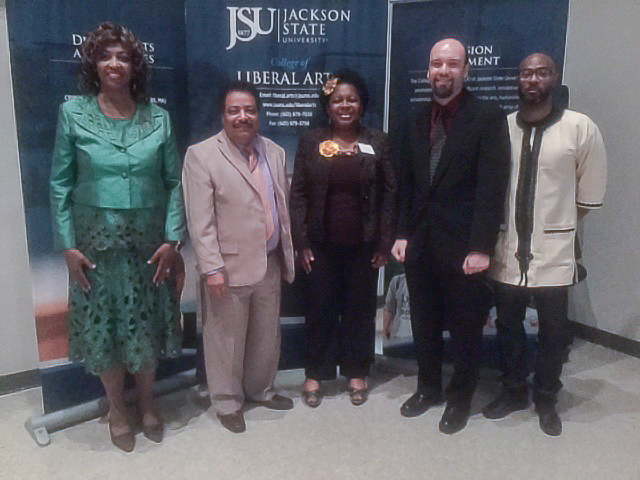![]() JSU College of Liberal Arts professor Dr. Mark Bernhardt was presented with the Teacher of the Year Award from the Mississippi Humanities Council, and he followed up the honor with a presentation Thursday about women sexuality during the 1920s with some modern-day references.
JSU College of Liberal Arts professor Dr. Mark Bernhardt was presented with the Teacher of the Year Award from the Mississippi Humanities Council, and he followed up the honor with a presentation Thursday about women sexuality during the 1920s with some modern-day references.
The celebration in the auditorium of the Dollye M.E. Robinson building on the main campus is part of the council’s annual statewide recognition of humanities faculty. Jackson State University is among 30 Mississippi colleges and universities that nominated a recipient for their institutions. The aim of the lectures is to “bring insight of the humanities to the larger public,” according to the council. So, each winning honoree is required to present a free, public lecture on a related subject.

Bernhardt, who accepted the award for JSU, said while working on his doctorate degree in history years earlier, he explored the historical nature of gender issues. Ultimately, this led him to develop the topic “She’s Got It! Depicting the Flapper Generation in Clarence.” Basically, this refers to American film director Clarence G. Badger of the early 1900s. His films include “It,” a silent romantic comedy that showcases the “irresistible sex appeal” of the lead female character.
JSU’s audience members reviewed several clips of “It” and analyzed Badger’s presentation of young women in the film, whether in the home or workforce.
Bernhardt said, “During the 1920s, the confluence of certain important social and cultural trends gave rise to a new morality in the United States. Beginning after the Civil War, the growth of the national consumer culture that encouraged people to seek personal fulfillment slowly led Americans to value immediate gratification over self-restraint.”
Furthermore, he said, “The late 19th century was also a time when some people began looking more to sciences and social sciences and less to religion for answers about how the world and human nature operated, raising questions about the constraints religion imposed on people’s lives.” Starting in the 1890s, Bernhardt said Americans increasingly began embracing a positive view of human sexuality and freely discussed new norms of sexual behavior. Eventually, this would lead to a hedonistic mentality, risqué fashions, higher divorce rates and premarital sex, and lower church attendance.
Fast-forward to the 1920s, he said young females became associated with the term “flapper” – urban, middle- and upper-class young women who challenged gender norms and began engaging in activities described as “un-ladylike.” They wore short skirts, excessive makeup, and began smoking and driving automobiles, just to name a few.
Concerns heightened even more over the growing number of single lower- and higher-class women living alone and their rising populations in the workforce. Some people frowned on their tendency to develop habits similar to men because it violated social norms.
The way in which women have been objectified has changed over time.”
— Dr. Mark Bernhardt, JSU associate professor of history
Given recent controversies about alleged misogyny and sexual predatory claims that ensnared GOP presidential nominee Donald Trump, today’s political climate provides fodder for how contemporary women are viewed, Bernhardt said.
Nevertheless, the rise of Hillary Rodham Clinton as a future president appears to further change the conversation about the abilities of women to rise above stereotypes and avoid being limited to subservient roles.
In addition, Bernhardt said, “The way in which women have been objectified has changed over time. It hasn’t been consistent. … It’s simply been a matter of what the focus is and how that’s done in different media forms throughout history.”
Using various films in his classes to analyze perceptions, he said one of his primary goals with his students is to help them realize the “historical roots and connections between what’s going on with the objectification of women today, in the 1920s and during various other time periods.” Bernhardt again emphasized that what happened in the 1920s is not exactly the same as what’s happening today. This is especially true with current media portrayal of women and Trump’s perceived missteps during this presidential season.
The Mississippi Humanities Council is an independent, nonprofit organization supported primarily by the National Endowment for the Humanities, grants and donations from private funders, corporations and individuals.
Because of his efforts and selection, Bernhardt received a cash gift and will be publicly recognized at an annual humanities awards dinner in February.






